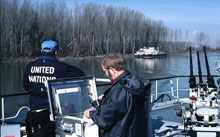Navigation
First Green Star Awards Given by UNEP, GCI and OCHA Honour Individuals, Organizations and Governments
The Green Star Awards honour individuals, organizations and Governments who demonstrate outstanding dedication to preventing, preparing for, and responding to the environmental impacts of man-made and natural disasters.
|
The Green Star Awards honour individuals, organizations and Governments who demonstrate outstanding dedication to preventing, preparing for, and responding to the environmental impacts of man-made and natural disasters. The awards are a joint initiative between Green Cross International (GCI), UNEP and the United Nations Office for the Coordination of Humanitarian Affairs (OCHA).
The new awards scheme provides a platform to promote and increase international participation in preventing, preparing for and responding to a range of environmental disasters. They came about as a result of the recommendation of the seventh meeting of the AGEE in June 2007 that an award be created to highlight the importance of environmental emergencies. They are defined as a sudden onset disaster or accident resulting from natural, technological or human-induced factors, or a combination of these, that cause or threaten to cause severe environmental damage and harm to human health and livelihoods.
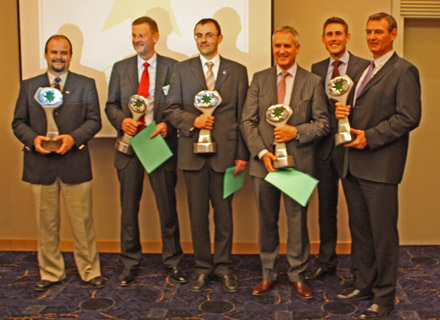 |
| The awards were accepted by: (Left to right) Professor Renato de Lima from CENACID, Mr Nils Svartz, Deputy Director General of the Swedish Civil Contingencies Agency; Dr. Marc Cadisch, Spiez Laboratory Director; Mr. Chris Dijkens, from the Dutch Ministry of Housing, Spatial Planning and the Environment; Mr. Niek De Regt from the Dutch Ministry of Foreign Affairs; and Mike Cowing. |
The 2009 winners are:
- Mike Cowing of the United Nations Environment Programme (UNEP);
- The Center for Scientific Support in Disaster Situations (CENACID) of Paraná Federal University in Brazil;
- Spiez Laboratory of Switzerland;
- The Government of the Netherlands; and
- The Government of Sweden.
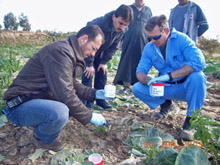 |
| Mike Cowing (in blue); The award reads: "With an outstanding track record and international reputation in the field of emergency environmental response, Mike Cowing embodies the type of dedicated, inspiring individual the Green Star Awards set out to honour. Mr Cowing, of the United Kingdom, is a world-class environmental expert with more than 25 years experience working in the developing world. A specialist in the management of hazardous and municipal waste and contaminated land, he has a wealth of experience addressing environmental and health concerns in conflict and disaster affected areas." |
“These first-ever recipients of the Green Star Awards have demonstrated immense dedication to and capacity for responding to environmental emergencies and also to helping affected populations both immediately and in the long run. Due to climate change and the increased frequency and severity of such disasters, it is important that the world becomes aware of environmental emergencies and the best way to respond quickly and adequately,” said Alexander Likhotal, the President of Green Cross International.
“These awards highlight the environmental impact of natural and man-made disasters. I hope that by improving awareness of the environmental consequences of such emergencies, we can improve response to future disasters by having more actors involved”, said John Holmes, United Nations Under-Secretary-General for Humanitarian Affairs and Emergency Relief Coordinator.
 |
| The award reads (excerpts); “The Center for Scientific Support in Disasters (CENACID-UFPR) is a special unit of Federal University of Paraná (UFPR) associated with the Interdisciplinary Center for Environment and Development (NIMAD) of UFPR… CENACID periodically organizes a Basic Training Seminar aimed at unifying members’ understanding of basic concepts related to disasters and emergencies, as well as providing knowledge about the activities of civil defense agencies. Training is also provided on specific skills such as the use of radio communications and maps. |
The Green Star Awards recognize the efforts of leaders whose work ultimately contributes to the stability of post-crisis societies, UN Under-Secretary-General and UNEP Executive Director Achim Steiner said.
“The links between environmental degradation, natural resource depletion and tensions that can evolve into conflicts is becoming ever clearer to the international community and will become ever more challenging unless climate change and unsustainable patterns of development are comprehensively addressed,” Mr Steiner said.
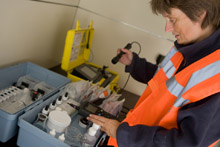 |
| "The Government of the Netherlands – most notably through the Crisis Management Department of the Dutch Ministry of Housing, Spatial Planning and the Environment (VROM), and the Dutch Ministry of Foreign Affairs – has been a primary force in recent years in improving international preparedness for, and response to, environmental emergencies. In doing so, they have set an important example for the international community and have helped to raise the quality standards for international response to humanitarian and environmental crises around the world." |
“2009 needs to be a year when the world not only seals the deal on a transformational new climate agreement, but also begins delivering a Green Economy — one that accelerates the fundamental shift to a low-carbon and resource-efficient future that fosters innovation, decent employment and equity between countries and communities, especially in some of the poorest and most vulnerable parts of the globe,” he added.
The awards ceremony was held in conjunction with the 8th meeting of the international Advisory Group on Environmental Emergencies (AGEE), which is being hosted this year by the European Commission.
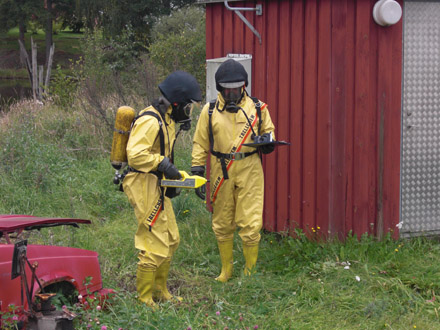 |
| The Triplex exercise held in Sweden in 2008. Sweden's award reads (excerpts): The Government of Sweden – notably through the Swedish Rescue Services Agency (SRSA), now integrated into the Swedish Civil Contingencies Agency (MSB), together with the Swedish International Development Cooperation Agency (SIDA), which has been funding most of SRSA’s deployments – has been one of the most prominent actors in efforts to prepare for, and respond to, environmental emergencies around the world…. Sweden has frequently contributed expertise in response to environmental emergencies. For this purpose, a roster has been established with stand-by associate experts. Some of the more recent missions have included: deployment of experts through the UNDAC mission in response to Hurricane Dean in Jamaica in August 2007; Rapid Environmental Assessment in response to Hurricane Felix in Honduras in September 2007, in response to Cyclone Nargis in Myanmar May 2008, and in response to a capsized ferry containing toxic cargo that occurred in July 2008 in the Philippines. In November 2008, Swedish expertise addressed disaster waste management issues following Tropical Storm Hanna and Hurricane Ike on the Turks and Caicos Islands, and in February 2009 provided geohazards risk assessments following heavy rains in September/October 2008 in Honduras….In June 2007, Sweden hosted the seventh meeting of the international Advisory Group on Environmental Emergencies (AGEE 7), a global forum held every two years, bringing together key stakeholders – government representatives, environmental experts and disaster managers – from around the world to share information, expertise and lessons learned to improve prevention, preparedness, and response to environmental emergencies. AGEE 7 gave birth to the Rosersberg Initiative…aimed at strengthening international preparedness and response to environmental emergencies….Sweden, through the SRSA, played an important role in designing and participating in the pilot Environmental Emergencies Training (EET) held in August 2008 in the Netherlands. |
 |
| Spiez Laboratory in Switzerland. |
Pictures of International Operations of the SPIEZ Laboratory
The award reads in part: Spiez Laboratory is the Swiss institute for protection against nuclear, biological and chemical (NBC) threats and hazards. The laboratory forms part of the Swiss Office for Civil Protection and deals with the scientific and technical aspects of hazards associated with NBC incidents. Over the past 10 years, Spiez Laboratory has offered in-kind support to the United Nations Environment Programme (UNEP), providing invaluable assistance to UNEP’s Post-Conflict and Disaster Management Branch for its Disasters and Conflicts operations, including the Joint UNEP/OCHA Environment Unit, for its Disasters and Conflicts operations.
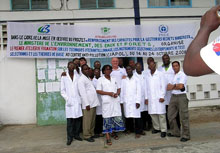 |
| 2008 UNEP-Mission Ivory Coast: capacity building for laboratory testing in Abidjan |
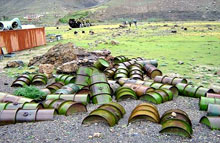 |
| 2006 - UNEP Mission in the Panjir Valley in Afghanistan: Investigation concerning military waste |
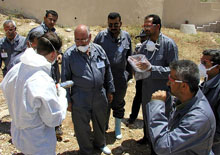 |
| 2005 - UNEP course for Iraqi environmental specialists in Jordan |
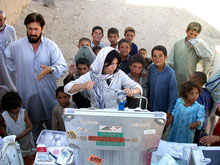 |
| 2002 - Mission in Afghanistan for the UN Environment Programme (UNEP): Post conflict environmental assessment focussing on the quality of drinking-water |
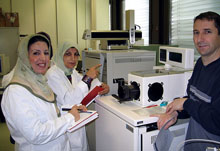 |
| 2004 - UNEP workshop for Iraqi experts in Spiez |
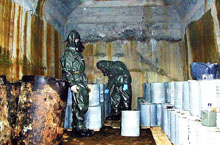 |
| 2001 - NATO/PfP-Mission in Albania: destruction of toxic waste |
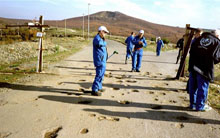 |
| 2002 - UNEP Mission Bosnia-Herzegowina: Depleted Uranium Field Assessment |
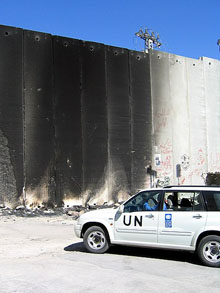 |
| 2004 - UNEP-Mission Palestine: capacity assessment in the occupied territories |
Search
Latest articles
Agriculture
- World Water Week: Healthy ecosystems essential to human health: from coronavirus to malnutrition Online session Wednesday 24 August 17:00-18:20
- World Water Week: Healthy ecosystems essential to human health: from coronavirus to malnutrition Online session Wednesday 24 August 17:00-18:20
Air Pollution
- "Water and Sanitation-Related Diseases and the Changing Environment: Challenges, Interventions, and Preventive Measures" Volume 2 Is Now Available
- Global Innovation Exchange Co-Created by Horizon International, USAID, Bill and Melinda Gates Foundation and Others
Biodiversity
- It is time for international mobilization against climate change
- World Water Week: Healthy ecosystems essential to human health: from coronavirus to malnutrition Online session Wednesday 24 August 17:00-18:20
Desertification
- World Water Week: Healthy ecosystems essential to human health: from coronavirus to malnutrition Online session Wednesday 24 August 17:00-18:20
- UN Food Systems Summit Receives Over 1,200 Ideas to Help Meet Sustainable Development Goals
Endangered Species
- Mangrove Action Project Collaborates to Restore and Preserve Mangrove Ecosystems
- Coral Research in Palau offers a “Glimmer of Hope”
Energy
- Global Innovation Exchange Co-Created by Horizon International, USAID, Bill and Melinda Gates Foundation and Others
- Wildlife Preservation in Southeast Nova Scotia
Exhibits
- Global Innovation Exchange Co-Created by Horizon International, USAID, Bill and Melinda Gates Foundation and Others
- Coral Reefs
Forests
- NASA Satellites Reveal Major Shifts in Global Freshwater Updated June 2020
- Global Innovation Exchange Co-Created by Horizon International, USAID, Bill and Melinda Gates Foundation and Others
Global Climate Change
- It is time for international mobilization against climate change
- It is time for international mobilization against climate change
Global Health
- World Water Week: Healthy ecosystems essential to human health: from coronavirus to malnutrition Online session Wednesday 24 August 17:00-18:20
- More than 400 schoolgirls, family and teachers rescued from Afghanistan by small coalition
Industry
- "Water and Sanitation-Related Diseases and the Changing Environment: Challenges, Interventions, and Preventive Measures" Volume 2 Is Now Available
- Global Innovation Exchange Co-Created by Horizon International, USAID, Bill and Melinda Gates Foundation and Others
Natural Disaster Relief
- STOP ATTACKS ON HEALTH CARE IN UKRAINE
- Global Innovation Exchange Co-Created by Horizon International, USAID, Bill and Melinda Gates Foundation and Others
News and Special Reports
- World Water Week: Healthy ecosystems essential to human health: from coronavirus to malnutrition Online session Wednesday 24 August 17:00-18:20
- STOP ATTACKS ON HEALTH CARE IN UKRAINE
Oceans, Coral Reefs
- World Water Week: Healthy ecosystems essential to human health: from coronavirus to malnutrition Online session Wednesday 24 August 17:00-18:20
- Mangrove Action Project Collaborates to Restore and Preserve Mangrove Ecosystems
Pollution
- Zakaria Ouedraogo of Burkina Faso Produces Film “Nzoue Fiyen: Water Not Drinkable”
- "Water and Sanitation-Related Diseases and the Changing Environment: Challenges, Interventions, and Preventive Measures" Volume 2 Is Now Available
Population
- "Water and Sanitation-Related Diseases and the Changing Environment: Challenges, Interventions, and Preventive Measures" Volume 2 Is Now Available
- "Water and Sanitation-Related Diseases and the Changing Environment: Challenges, Interventions, and Preventive Measures" Volume 2 Is Now Available
Public Health
- Honouring the visionary behind India’s sanitation revolution
- Honouring the visionary behind India’s sanitation revolution
Rivers
- World Water Week: Healthy ecosystems essential to human health: from coronavirus to malnutrition Online session Wednesday 24 August 17:00-18:20
- Mangrove Action Project Collaborates to Restore and Preserve Mangrove Ecosystems
Sanitation
- Honouring the visionary behind India’s sanitation revolution
- Honouring the visionary behind India’s sanitation revolution
Toxic Chemicals
- "Water and Sanitation-Related Diseases and the Changing Environment: Challenges, Interventions, and Preventive Measures" Volume 2 Is Now Available
- Actions to Prevent Polluted Drinking Water in the United States
Transportation
- "Water and Sanitation-Related Diseases and the Changing Environment: Challenges, Interventions, and Preventive Measures" Volume 2 Is Now Available
- Urbanization Provides Opportunities for Transition to a Green Economy, Says New Report
Waste Management
- Honouring the visionary behind India’s sanitation revolution
- Honouring the visionary behind India’s sanitation revolution
Water
- Honouring the visionary behind India’s sanitation revolution
- Honouring the visionary behind India’s sanitation revolution
Water and Sanitation
- Honouring the visionary behind India’s sanitation revolution
- Honouring the visionary behind India’s sanitation revolution

